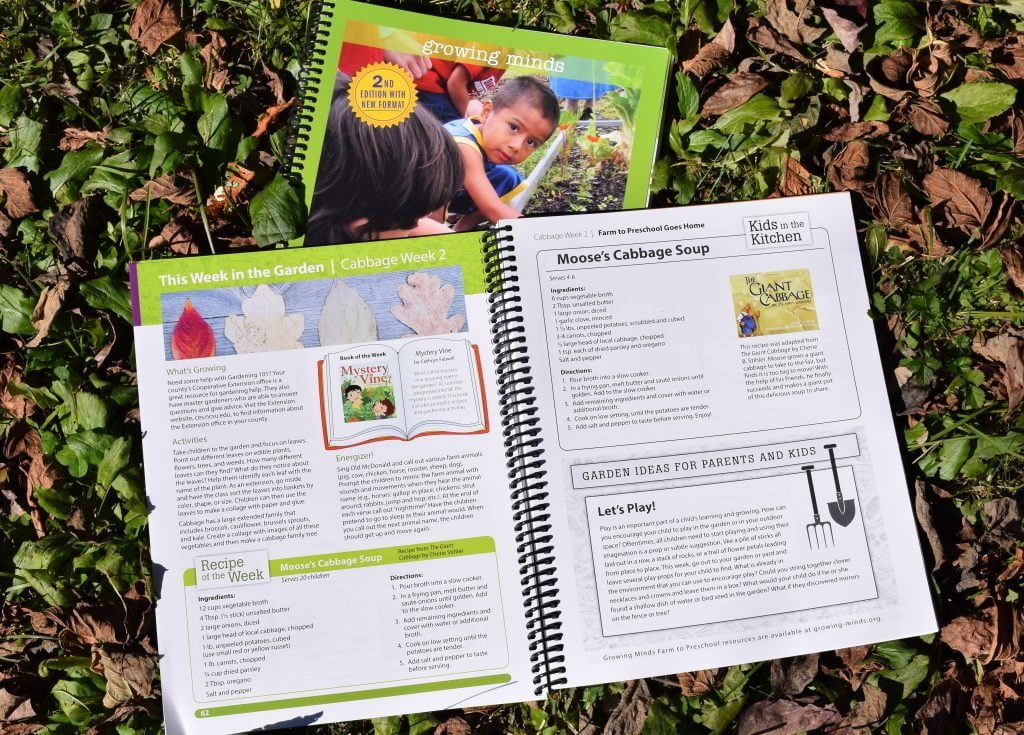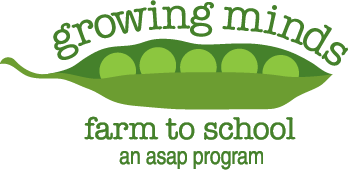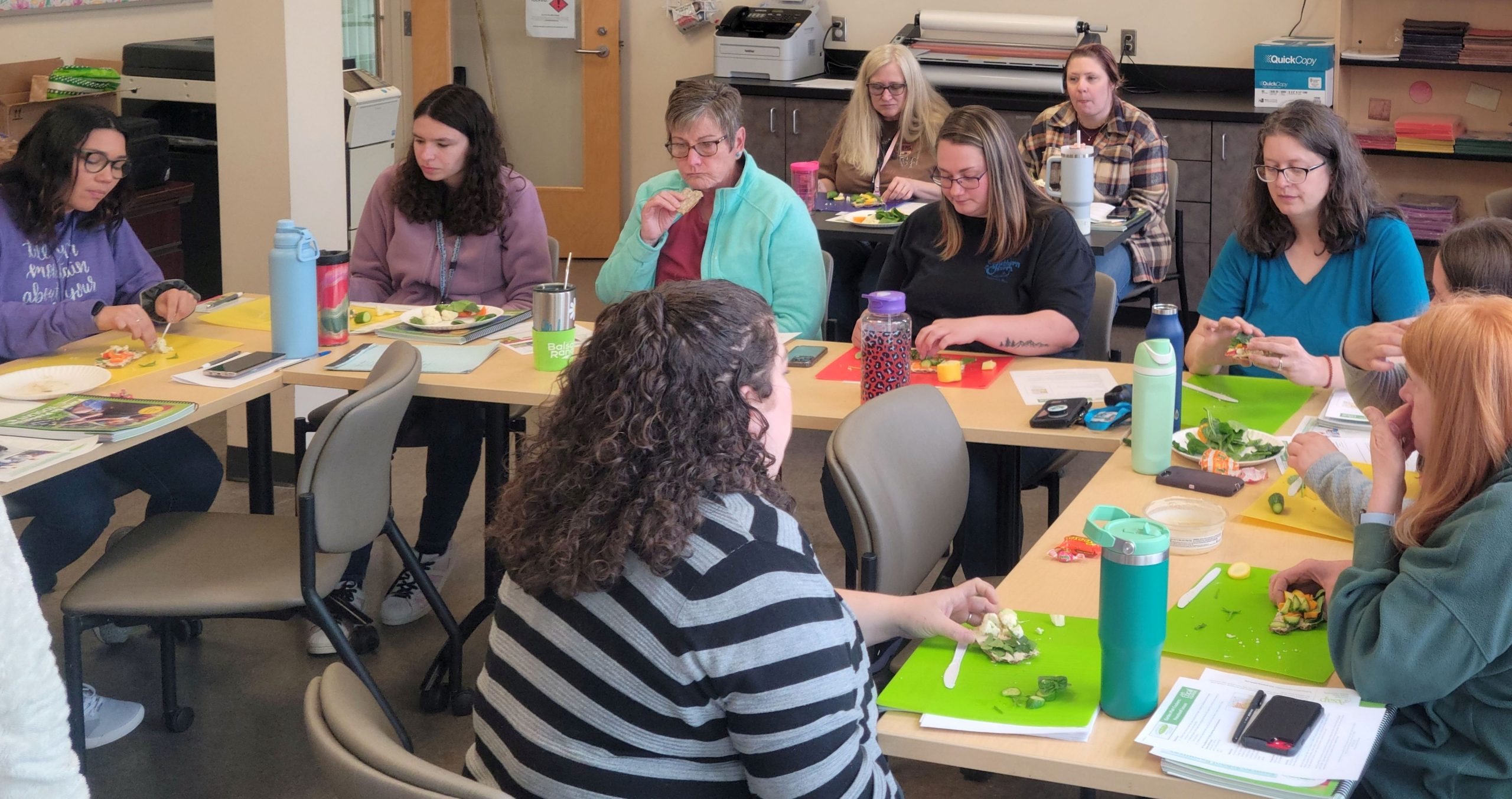North Carolina is creating a model for integrating farm to preschool into community college curriculum. By incorporating farm to preschool into your curriculum, your students will enter their careers equipped with the knowledge and skills to impact children and families through local food and farm to preschool activities.
What Does Growing Minds Offer Community Colleges?
You have already found one of the most valuable resources that we offer community colleges—this web page! We have compiled all of our farm to preschool online resources in one place.
We have created this handout for you to share with colleagues that you think may be interested in incorporating farm to preschool into their courses.
If there are other resources that would be helpful to have for your ECE courses, please email us at growingminds@nullasapconnections.org and let us know what you would like to see added to this page.
Growing Minds Farm to Preschool Toolkit

The Farm to Preschool Toolkit is our comprehensive resource for all things farm to preschool. The Toolkit is available as a spiral-bound hard copy or a free digital download. It includes:
- Lesson plans that are aligned with NC Foundations for Early Learning and Development and children’s literature
- This Week in the Garden: Preschool Edition activity guides
- Farm to School Goes Home take-home resources
- Reach for the Stars with Farm to Preschool: Aligning Early Childhood Environmental Rating Scale, Revised Edition (ECERS-R) and Infant/Toddler Environment Rating Scale, Revised Edition (ITERS-R) with Farm to Preschool (pg. 4-16 of the Toolkit)
- CROSSWALK: Farm to preschool lesson plans aligned with CACFP reimbursements
- And numerous resources for implementing all components of farm to preschool
In-Person & Online Training
Are you interested in having the Growing Minds team offer a farm to preschool training to your community college instructors? Email us at growingminds@nullasapconnections.org to discuss training opportunities.
Assignment Ideas
Need some inspiration for how to incorporate farm to preschool and the Toolkit into your students’ assignments? We’ve compiled assignment ideas, as well as a sample of assignments from courses at Blue Ridge Community College here.
You can also have your students create their own farm to school lesson plan using our Growing Minds Lesson Plan Template.
Children’s Literature Connections
All Growing Minds’ lesson plans and This Week in the Garden activity guides are paired with a book. Download the complete list of books we recommend.
Classroom to Home Connections
An important element of farm to preschool activities is to make the connection between what children are tasting and learning about in the classroom to their families. You can use the following resources with your community college students to model ways to make the classroom to home connection.
Resources:
- Our seasonal Growing Minds Day by Day resources lists (launched during the COVID-19 pandemic) follow a weekly theme, are designed to provide educators and caregivers with online children’s book read-alouds, simple activities, local food recipes, lesson plans, and more.
- Meet Your Farmer & Junior Farm Tour videos are designed to take educators and families on “virtual farm tours” when an in-person visit to a farm is not a feasible option. Each video is paired with complimentary Growing Minds lesson plans and activity extensions.
- Within the Toolkit you will find Farm to School Goes Home handouts for each week of the year. These family activity guides include recipes and gardening ideas to help connect families with what local produce their child is learning about in the classroom.
- Sending children home with “I tried local…” stickers and recipe cards is an invitation for families to discuss and learn about what their child is tasting in the classroom. Please fill out the Materials Request Form at the bottom of this page to receive free class sets of stickers and recipe cards.
- Free taste test signs hung outside of classroom doors allow families to see what new local produce their child will be tasting.
Equity and Inclusion Resources
Children begin to develop racial awareness and bias at a very young age. In an effort to create learning environments that are more diverse, inclusive, and reflective of our culturally diverse society, farm to school programs should follow equity-minded best practices. Visit our Equity, Inclusion and Anti-Bias resources page to view our equity statement, find children’s books (including farm to school literature) that celebrate diverse voices, and access recommended external resources that can be used by both teachers and parents to teach children about race, diversity, and inclusion.
Presentation for ECE Courses
We have created a presentation that is ready to use in your online and seated classes. In the presentation you will find:
- Intro to Growing Minds, slides 1-6
- Intro to Farm to Preschool, slides 7-13
- Intro to Growing Minds Farm to Preschool Toolkit, slides 14-15
- Edible Gardens, slides 16-30
- Local Food Taste Tests, slides 31-39
- Local Food Cooking in the Classroom, slides 40-47
- Local Food in Meals and Snacks, slides 48-49
- Support and Resources from Growing Minds, slides 50-55
Click here to view or download a copy of this presentation from Google Slides.
Gardening
Resources:
- Food and farm lesson plans (also found in the Farm to Preschool Toolkit)
- This Week in the Garden: Preschool Edition activity guides for each week of the year (also found in the Farm to Preschool Toolkit), you can use them as is or download and edit them to include your own information
- Building Positive Experiences with Healthy Food: Gardening with Children, pg. 182 in the Toolkit
- Strategies for Gardening with Children, pg. 182-184 in the Toolkit
- Plant List for Pre-K Gardens, pg. 185-190 in the Toolkit
- Free seasonal bulletin board sets
- Free seeds for edible gardens. Email growingminds@nullasapconnections.org for more information.
- Our free Growing Minds @ Market Manual is full ideas to provide garden-based activities in any setting including community events and classrooms.
Taste Tests & Classroom Cooking
Resources:
- Cooking with Preschool Children, pg. 191 in the Toolkit
- Tips for Cooking with Preschool Children, pg. 192 in the Toolkit
- Simple Recipe Ideas for Preschool Children, pg. 193 in the Toolkit
- Cooking Abilities of Young Children, pg. 194 in the Toolkit
- Best Practices for Cooking with Children in Licensed Child Care, pg. 195 in the Toolkit
- CROSSWALK: F2P Lessons Aligned with CACFP Reimbursements, pg. 46-48 in the Toolkit
- Need recipes? Each month there are at least eight recipes featured in the Toolkit. If you would like more recipe ideas, check out the Growing Minds website.
- Free taste test signs
- Free seasonal bulletin board sets
Farm Field Trips & Farmer Visits
Resources:
- Use The Hayride: A Resource for Educational Farm Field Trips to help in planning your farm field trip.
- Need help finding a farm to visit or a farmer to invite to your classroom? If you are in Western North Carolina use ASAP’s online Local Food Guide. If you are out of Western North Carolina you can contact your county’s Cooperative Extension office and they can help you find farmers in your area.
Local Food in Meals & Snacks
Resources:
- Incorporating Local Food Into Your Food Service, pg. 179 in the Toolkit
- Questions to Ask Your Produce Provider, pg. 180 in the Toolkit
- How to Start the Conversation: A Food Service Director and Farmer Conversation Guide, pg. 181 in the Toolkit
- Toolkit Pantry and Equipment List, pg. 196 in the Toolkit
- Free seasonal bulletin board sets
- Seasonal recipes

